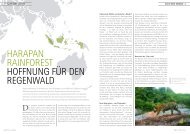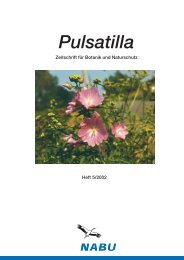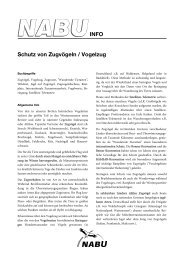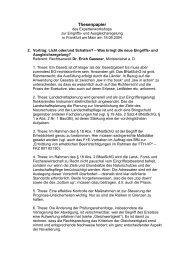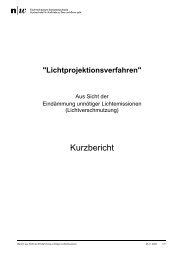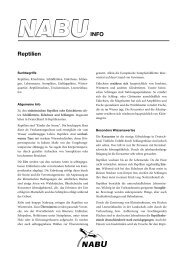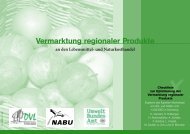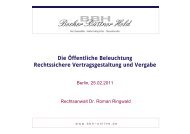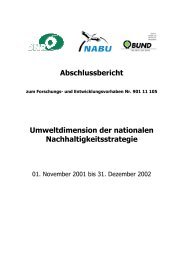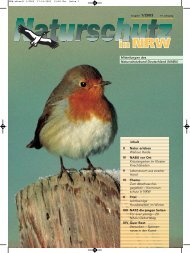Studie "The GMO-emperor has no clothes" (engl.) - Nabu
Studie "The GMO-emperor has no clothes" (engl.) - Nabu
Studie "The GMO-emperor has no clothes" (engl.) - Nabu
You also want an ePaper? Increase the reach of your titles
YUMPU automatically turns print PDFs into web optimized ePapers that Google loves.
Italy<br />
Almost all regions in Italy have stood up against<br />
GM crop cultivation and, these regions have<br />
played a fundamental role in Europe in respect to<br />
regulations related to GM crop cultivation.<br />
In 2000, Tuscany was the first region to adopt<br />
a law, which prohibited the cultivation of<br />
transgenic crops in its territory. As an anti-<strong>GMO</strong><br />
leader in Italy, and throughout Europe, Tuscany<br />
instituted several international initiatives, such as<br />
the European Network of <strong>GMO</strong>-free Regions<br />
and Local Authorities and the International<br />
Commission for the Future of Food and<br />
Agriculture. In 2005, 20 regions met in Florence<br />
and signed the Bill of Regions and Local European<br />
Authorities on the issue of coexistence between <strong>GMO</strong>s,<br />
conventional and organic agriculture, also k<strong>no</strong>wn as<br />
the “Florence Bill,” which identified a number of<br />
fundamental principles for governmental action on<br />
the issue of <strong>GMO</strong>s. Today, 55 regions are members<br />
of the European Network of <strong>GMO</strong> free Regions.<br />
In Italy civil society groups have also strongly<br />
reacted to the expropriation of their food rights. An<br />
alliance between social and eco<strong>no</strong>mic organizations<br />
and a heterogeneous majority, held a national<br />
consultation on <strong>GMO</strong>s in which citizens were able<br />
to obtain information and express their preference,<br />
which <strong>no</strong>t surprisingly opposed <strong>GMO</strong>s.<br />
Norway<br />
Although there is <strong>no</strong> legal commercial production<br />
of <strong>GMO</strong>s in Norway, its National Pension<br />
Fund invests in Monsanto. Youth-led civil<br />
society groups in Norway are engaged in a<br />
campaign calling on the finance minister to divest<br />
investments in Monsanto.<br />
Poland<br />
Poland retains a large peasant farming tradition<br />
of some 1.4 million small family farms that work<br />
mostly on a subsistence level. <strong>The</strong>n there is a<br />
tranche of medium- sized traditional farms and an<br />
area of large-scale mo<strong>no</strong>cultures. Some 2 million<br />
farmers comprise the total on farm work force.<br />
Poland emerged into the 21st century with<br />
a reasonably robust legal act to prevent<br />
indiscriminate planting of GM seeds/crops.<br />
However, as the 2004 date of Polish entry into<br />
the EU approached, the pressure to adopt GM<br />
plants gathered momentum. Pro-GM trade<br />
representatives from the U.S. Department of<br />
Agriculture visited Poland frequently and the<br />
U.S. Embassy in Warsaw became the quasi<br />
headquarters of pro-GM lobbying activities, with<br />
close ties to the Monsanto corporation. Cargill<br />
mounted a similar offensive on the GM animal<br />
feed front and used advertising on U.S. television<br />
to depict Polish peasant farmers as an outdated,<br />
poor but romantic underclass in need of Cargill’s<br />
generosity in supplying “cheap” nitrates to make<br />
them competitive.<br />
In order to counteract the intense GM<br />
propaganda machine, civil society worked with<br />
regional governments, many of which created<br />
<strong>GMO</strong> free regions. In 2006, Prime Minister<br />
Kaczynski responded by banning the import and<br />
planting of GM seeds and banning GM animal<br />
feed. Poland thus became the first Country<br />
in Europe to enact such a ban. In 2007 a new<br />
government was elected and from this time<br />
forward, Poland is more sympathetic to accepting<br />
<strong>GMO</strong>s. Civil society <strong>has</strong> managed thus far to<br />
“hold the line” on <strong>GMO</strong>s.<br />
Russia<br />
Polls show that Russian society is largely opposed<br />
to <strong>GMO</strong>s with 86 percent expressing disapproval<br />
of allowing any breeding of GM seeds or crops<br />
and 73 percent are against having <strong>GMO</strong>s in food.<br />
<strong>The</strong>re is a robust anti-<strong>GMO</strong> movement in Russia<br />
consisting of environmental groups, scientists,<br />
farmers, health professionals, consumers, and<br />
more.<br />
Russian legislation does <strong>no</strong>t directly prohibit<br />
the breeding of <strong>GMO</strong>s. <strong>The</strong>re are procedure to<br />
permit such breeding in the Russian Federation<br />
through environmental and biological safety<br />
tests by certified scientific institutions, by the<br />
Commission of State Environmental Expertise<br />
and final consideration by the Ministry of natural<br />
resources and environment. No permit <strong>has</strong> yet<br />
been granted.<br />
Representatives of the U.S. government and<br />
multinational biotech<strong>no</strong>logy corporations<br />
strongly advocate for <strong>GMO</strong>s in Russia. During<br />
negotiations for Russia’s accession to the World<br />
Trade Organization (WTO), the U.S. insisted<br />
that the Russian Federation sign a special<br />
agreement on biotech<strong>no</strong>logy which calls for<br />
Russia to <strong>no</strong> longer label foods containing <strong>GMO</strong>s<br />
and establishes patent and usage rights for U.S.<br />
corporations that cultivate GM seeds and crops<br />
within Russia. <strong>The</strong>se measures will go into effect<br />
upon Russia’s accession to the WTO, which, at<br />
this writing, is expected to take place in 2011 or<br />
early 2012.<br />
Independent scientific testing of the effects<br />
of <strong>GMO</strong>s on rats, hamsters, and mice have<br />
generated great concern as to the safety of<br />
<strong>GMO</strong>s. <strong>The</strong> tests have been conducted by: Dr.<br />
38



